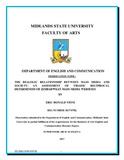Please use this identifier to cite or link to this item:
https://cris.library.msu.ac.zw//handle/11408/2895| Title: | The dialogic relationship between mass media and society: an assessment of triadic reciprocal determinism of Zimbabwean mass media websites | Authors: | Ntini, Eric Donald | Keywords: | Dialogue Reciprocal Mass media, Identity, discourse and ideology |
Issue Date: | 2017 | Publisher: | Midlands State University | Abstract: | Zimbabwean mass media has profoundly been polarised by two significant camps, pro-government and anti-government mass media establishments. Public opinion has primarily been centered on the binary ideological inclinations of these two camps. The heavily censored political environment in Zimbabwe since the imposition of the Public Order and Security Act 11 17(POSA) resulted in political interaction and expression of personal dispositions being subverted thereby resulting in ‘silences’ as far as the conceptualisation of mass media and its role and effects on society is concerned. Social media networking platforms, such as Facebook, WhatsApp and websites have ushered a plethora of non-elite media spaces and contexts for studying how audiences create meaning and influence each other in the interpretation of information distributed by mass media entities. This is a qualitative research aimed at exploring the dialogic nature of mass communication with particular attention being paid to the notions of interaction and negotiation of meaning between mass media in Zimbabwe and the audience/society in a news website. The research is underpinned by Critical Discourse Analysis (CDA) and the Social Constructionist Theory. Critical Discourse Analysis on the one hand is used to explore discourse and ideological interaction occurring between mass media and its audience in the news website comments section. The Social Constructionist Theory on the other hand is used to explore how online communication as a triadic reciprocal social practice and construct is both modelled and remodelled by society through processes of co-production and negotiation of meaning. The research also takes into account the varied titles/names that the participants employ in their online interaction. This research therefore attempts to explore a specific site of discourse as an environment for social change and transformation of the media genre. | URI: | http://hdl.handle.net/11408/2895 |
| Appears in Collections: | Ba English And Communication Honours Degree |
Files in This Item:
| File | Description | Size | Format | |
|---|---|---|---|---|
| Eric Ntini- R137479Q.pdf | Full Text | 1.42 MB | Adobe PDF |  View/Open |
Page view(s)
78
checked on Feb 26, 2025
Download(s)
40
checked on Feb 26, 2025
Google ScholarTM
Check
Items in MSUIR are protected by copyright, with all rights reserved, unless otherwise indicated.


